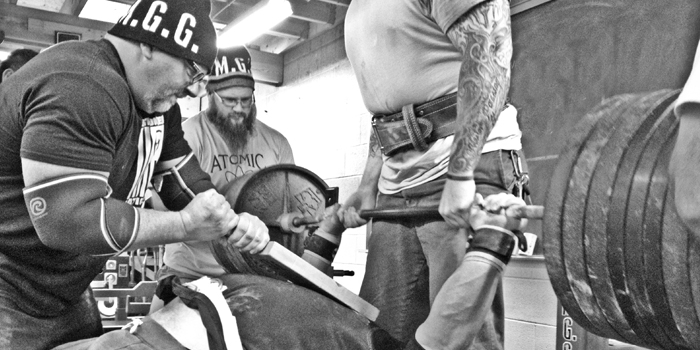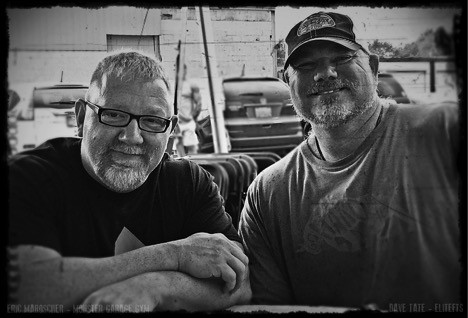
With the end of an old year and the start of a new year, most take the time to reflect on the past as well as look at the possibilities of the future.
This is not unlike looking at your training following a meet as you begin the process of preparing for the upcoming meet. When looking back at the past meet, you have data—and lots of it—that can help lead you toward improvement for your next meet. You can look at your training, sets, reps, numbers, your sleep patterns, your nutritional intake, and other data. You can look back at any video footage and see improvements or gaps in your technique. You can see when you made lifts or perhaps missed them. The data is all there for us to use, and if we really study it, we improve at the next meet and the next and the next.
When it comes to that aspect of our lives, the lifting side, we as competitive powerlifters are pretty good at this. Even those who repeat mistakes will eventually catch on and modify the parts of their training that are not taking them where they want to go.
RECENT: Do You Have the Guts to be a Successful Powerlifter?
I have heard Dave Tate say over and again that if your whole life is nothing but lifting, not only will your life suffer, but ultimately your lifting will as well. Over the past 25 years in this sport, I have had a front row to witness this very thing: lifters whose lives are inordinately myopic toward their lifting, and because of this non-symmetrical life balance, their lifting suffers for it. This sounds counterintuitive, saying that too much focus on your lifting negatively impacts your lifting, but this is the ironic truth, as the lack of balance with the other major pillars of our lives is where the wheels fall off the wagon.
As this New Year has begun, just like you have lifting data, you also have “life” data. Most serious lifters have a lifting log they use religiously, and in life, many have a diary. But for those who don’t keep such a copious log of your life, indirectly you still have life reflection data via your social media footprint.
Think about that for a moment. Be it Instagram, Twitter, Facebook, or some other form of social media, your posts tell a great deal about you as a person. Take an investment in your future growth and after you finish reading this, go to the social media source that you post from the most. Look at the last 100 posts. This seems like a lot, but for some, that is merely a week or two. There are categories for your posts to fall into. Look to see what category they fall into.
There are big all-catching categories, but there are the more important sub-categories. For example, many posts are observational: the weather, a recent movie critique, work, etc. But the sub-category is what the social media users want to tell the world about themselves. Meaning, if the last 15 posts are an observation about the weather, are the posts about the wonderment of the weather or are the posts merely an outlet for a complaint about the weather? If the post is about work, is the post about a fun experience with a colleague, about a work success that helped someone, or is the post merely an outlet for a complaint about the job?
As you look at your daily feed from your social media friends, even without reading them, you can think of ten of your friends and you will know with 90% accuracy what the sub-category of their post will be. Some of your friends will post something inspirational and uplifting, while some will virtually always post about "what is wrong with others" or "what people should not do" or "what is wrong with this or that." Others may be self-absorbed and post, "Here is what I did today, and yesterday, and the day before that, and here is what I am doing right now.”
Some posts are positive and that tells you something about that person. If you look at their life in general, you can see that they are often on a forward moving path. Some posts are virtually always negative and if you look at that person's life in general, you can see that they often are frustrated and the posting about those issues never ends. Some of your “friend’s” posts are all about them: "Here is what I did, here is where I went, here is how much I lifted." And if you look at their lives in general, you can see that they are either in need of affirmation or simply lack self-esteem, thus the reason they look to their social media friends to “like” their accomplishments.
As you think of the friends you have on social media, in your mind’s eye you know what sub-category they fall into virtually all of the time. With that said, the same goes for all of your social media friends' observations of you, via your posts. Are your posts expressing pride and accomplishments of others, or are they egocentric and always about you? Are your posts about finding the positives in the world, or are they nearly always zeroed in on only the negative? Are your posts about the achievements of others, or the faults of others?
Just like you look back at your training and find the aspects that helped you as a lifter with regard to your most recent meet success or failure, take a look at your last 100 posts and you can use that as a guide to see yourself from another’s perspective. You might look back and find that your social media footprint is inspiring to others. You might look at it and note that you do find the good in most things, realizing that we all have days that can bring us down. Or you might look at your posts, the stuff you put out into the universe, and see that the vast majority of it is negative, perhaps useless, or maybe even hurtful.
Jean-Paul Sartre, the French philosopher, was all about existentialism: that our existence precedes our essence and that being authentic—in laymen’s terms, making the world better or more human—is our only possible reason for existing. This somewhat feeds into the modern day philosophers who, through quantum physics, feel that what you put out into the universe, you will receive back. In other words, if you as an individual put out into the universe nothing but the negative, then you will continue to see and be bombarded with nothing but the negative. This is not to be confused with karma, as quantum physics entails the ability to generate what comes your way by what you put out there. Meaning, putting out into the world the positives will, like a boomerang, bring back to you more positives. The same is true when focusing on the negatives, as that will result in more negatives coming to you as well. In its physical form, good technique and a good training cycle will yield good results, but a poorly constructed training cycle based on a foundation of sub-par technique will produce poor meet results.
Although each day is an opportunity for improvement, a new year is often seen as the right time to seize this opportunity. As humans, a key measurement for us to have perspective in our lives is the measurement of time. The New Year means 365 days of our life has passed. For many, a new year can mean a new start with regard to being a better form of themselves. Just like your competition is a reflection of you during that training cycles, your past year of social media posts can be used as a template of reflection about you as a person and your views on life and the world around you.
When Dave Tate talks about pillars of your life (lifting, family, work, and spirituality) your overall outlook is of paramount importance, as it will color how you see all four pillars of your symmetrical life. Stated another way, you have these four pillars or cornerstones, and your overall view of life is the umbrella that is the overarching theme that can be applied to each and every pillar. Your positive or negative view of lifting, your positive or negative view of family, your positive or negative view of work, and your positive or negative view of spirituality will color each of these pillars. Within these four pillars is interconnectivity, and each one has influence and impact on the other.
A simplistic example could be that one’s constant and unrelenting negative view of their job will bleed into their training session and a sub-par training session comes home with you and negatively impact your interactions with family and loved ones. It is the establishment of four or so independent and equally symmetrical pillars of your life, as well as one’s ability to bathe and steep and nurture those pillars in the positive, that creates exponentially powerful chances for fulfillment. When looked at from the lens of the lifter, that is when the training sessions take off and the PRs start to fall like rain.
Feedback and data are critical for us moving forward in all aspects of our lives, as is trying to see and find the good within each of the four pillars. Not using data and trying to move forward is as random and failure-laden as getting ready for a meet by just picking up random weights with no plan whatsoever. Trying to improve your overall life-view without looking back on data is also destined to produce less than stellar results.
Whether you have some minor tweaking to do or you require a major overhaul, looking back at the prior year and how you viewed the world around you via your diary or social media posts will ultimately serve to provide you with some of the data you will need to gather a complete picture of your life perspective.
RELATED: The Education of a Powerlifter
Sometimes looking inward at ourselves can be uncomfortable, but this is true in our lifting as well. We all just want to pick up heavy stuff, but the reverse hyper, glute ham raises, and car-dee-oh are things that can be uncomfortable. So just like we do the less fun stuff in order to be a better form of ourselves as a lifter, we need to be uncomfortable and look at our output into the universe. This can show us things about ourselves that are not so pleasant. Pleasant or not, growth in all aspects requires us to look at where we have been in order to help determine where we want to go.
In your mind’s eye, think back to the last time you went out to a really good restaurant. Think about how you studied the menu. You took a good chunk of time sitting in silence looking over the menu, as you wanted to make sure you put the best things together to build a fantastic meal. Think back at the last training program you put together. You spent hours and hours on it. You put in many hours for that eight or 12-week training cycle.
Now, think back to the last time you just sat and thought about your life and the type of outlook you have about the world in general. Think about how that outlook will impact the four pillars of your life (lifting, family, job, spirituality). My guess is that you put more time into looking at the menu for a 30-minute meal than you have ever invested in sitting back and silently pondering how your overall outlook about the wonderment around you can impact your life and its four pillars.
Let that sink in for a minute. In your life, how many times have you sat alone with no smart phone, no television, and no music? How much time do you spend with just you and your thoughts, all alone pondering how you perceive the world around you and how that perception influences the pillars of your life? It is staggering how little time we invest in our own growth but how much time we waste on trivial things.
Dave talks about the trap of majoring in the minor things. That is a trap we all fall into. We spend a month contemplating Knee Wrap X versus Knee Wrap Y, but don’t put in a moment about how we want to grow as an overall person. The overall person is the single most important factor when it comes to putting together a plan for the lifting pillar of your life.
So here we are at the end of the article. You’ve read all the way to the end, and now there are choices. Do you go surf some more and consider this 10 minutes of your day spent for nothing? Or do you go pull up the last 100 posts (or more) and go beyond just looking at your posts? Do you invest the time to tally up those sub-categories (positives, sharing of something to inspire, complaints, all-about-me, what is wrong with others, rants, etc.,) and invest the time to really and truly begin to explore your overall outlook on life and who you are? When you look back at the posts, what sub-category do you fall into the most? What does that mean for you?
Our life paths are not based on big fork-in-the-road type decisions. To the contrary, life’s paths are chosen within the thousands of little innocuous decisions we make each and every day — decisions like where to go when you are done reading this. Will you move on with your day, or will you invest in your day?
Wishing you all the best in the New Year. Carpe diem and ever onward.













1 Comment